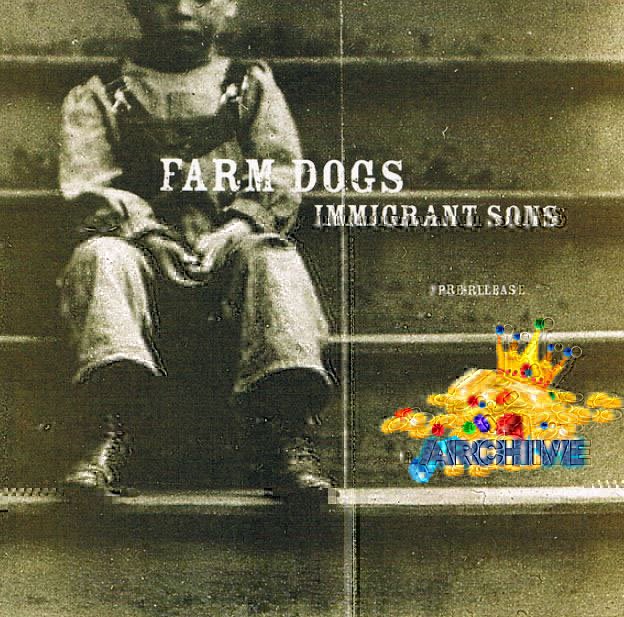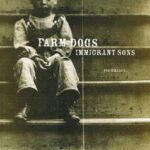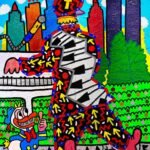Lyricist Taupin finally gets to sing for himself
The Dallas Morning News
Thursday 29 January 1998
On 20 April, Record Store Day will offer the first vinyl release of Last Stand in Open Country. The performers are Gershwin Prize honoree Bernie Taupin and his old country rock band, Farm Dogs. The music was first available in 1996. It has been compared to Tumbleweed Connection, but in later years Bernie thought those tracks no longer suited Elton. Find out more about this as well as the Farm Dogs‘ songwriting process via our Archive of the Month.
 It was an obscure song written for an obscure film and performed by an obscure singer named Elton John.
It was an obscure song written for an obscure film and performed by an obscure singer named Elton John.
“If your friends are there,” Bernie Taupin wrote, “then every-thing’s all right.”
Nearly 30 years later, those lyrics – written for the British film Friends – have become the soundtrack to Mr. Taupin’s life.
Mr. Taupin, the famed “brown dirt cowboy” lyricist whose work with Mr. John has created one of the largest, most popular catalogs in pop music, has spent more than half his life listening to his words being sung by other people.
Now he has his own band, Farm Dogs, his own microphone and an outlet for his fascination with the American West, which has tugged at him since his childhood days in Lincolnshire.
And he’s doing it all with the help of his friends.
“These guys I’ve known since like, half my life,” Mr. Taupin, 47, says during a recent stopover in Dallas. “And I knew how well I got on with them, and I knew that they had the same kind of background as me and they liked the same kind of music.”
“These guys” are Jim Cregan and Robin Le Mesurier, two veteran rock ‘n’ roll guitarists who cut their teeth with the likes of Rod Stewart. Together with Mr. Taupin, they are the heart of Farm Dogs.
Their affection and respect for one another is clear. Good-natured ribbing elicits belly laughs throughout the interview.
“This band revolves and exists on a sense of humor – and a dry martini,” Mr. Taupin says. “There’s too many bands out there that are so angst-driven, that it’s almost like `turn your back on your audience.’ ”
“I just love doing Farm Dogs stuff, because it’s ours,” Mr. Le Mesurier says. “It really is great. It’s a dream – a dream come true for us. To get to have your own band, playing with your best friends. It’s like being in a gang.”
Mr. Taupin formed Farm Dogs three years ago. He had already made two disappointing solo albums and says he “had no great desire to do another solo record.”
He wanted to pull back and make “basically a really honest, simple, roots rock ‘n’ roll record. And I felt in order to do that…I wanted to do it as a band, because this kind of music is suited to a band situation.
“But I also didn’t want the total emphasis of everything to be on me – I didn’t want to be the focal point.”
Mr. Taupin sings and, of course, writes the lyrics. He says he cannot play an instrument, although “I’m learning the mandolin at the moment.”
Although far from polished, his voice suits the band’s jangly, unvarnished Americana style. Farm Dogs released its first album, Last Stand in Open Country, in 1996. Its latest album, Immigrant Sons, is due for release Tuesday. A single from the album, Daria, is already getting some airplay in Dallas on “The Zone” KKZN-FM (93.3).
It’s about a girl – no one in particular, Mr. Taupin says – and “just an overall general feeling of being pissed off at somebody.”
It’s the kind of song, Mr. Taupin says, that he can no longer write for Mr. John, whose days of singing about “Rotten Peaches,”
“Country Comfort” and burning down missions are long gone. “I wouldn’t give this to Elton,” he says. “He wouldn’t feel comfortable singing it. This is my lifeline to the kind of stuff that I really dig doing. I mean, yeah, I did it with Elton in the early days with Tumbleweed {Connection} and stuff like that, but obviously you can’t expect somebody to stay with that. You can’t imagine Elton even remotely doing a record like that anymore, because he’s become larger than life. To actually make a record that is that rustic, I don’t know if it’d work for him now.”
But it’s not just the subject matter that’s different, he says. With Farm Dogs, songwriting is more of a team effort.
He and Mr. John take a detached approach: Mr. Taupin writes the lyrics, turns them in, and Mr. John writes the music. It’s become an unlikely, yet legendary partnership – “like chalk and cheese,” Mr. Taupin once said – two friends who rarely see each other but are still able to crank out Top 40 hits with amazing speed and an uncanny, almost telepathic sense of what the other is looking for in a song.
They have produced a staggering list of pop staples, from “Your Song” to “Bennie and the Jets,” “Saturday Night’s Alright for Fighting” to “Candle in the Wind,” many of which Mr. John will perform Wednesday at his sold-out Reunion Arena concert.
“When I write, I write very, very fast, because ideas come very quickly,” Mr. Taupin says. “It doesn’t mean that it’s not as good as somebody who sits and slaves over things. Actually, Elton writes very quickly, too. He’s one of those people that, if it takes too long, he throws it away.”
Mr. John also doesn’t sweat out the meaning of the lyrics, he says.
“I remember one instance when I was standing on the side of the stage and he was singing this song,” Mr. Taupin says. “And it was about 10 years after we’d recorded it, and he turns around and he goes, `I’ve just figured out what this song’s about!’ ”
With Farm Dogs, the band will sit around a coffee table in the den at Mr. Taupin’s California ranch in the Santa Ynez Valley, Mr. Taupin will dump some lyrics on the table, and the process begins.
“There’s a lot of respect,” says Mr. Cregan, who has written more than 30 songs with Rod Stewart. “You are allowed to put an idea out without worrying about `People might laugh at me.’ We’ve got a lot of trust in the other one. Any pulling of the leg, it’s done in good humor.”
Mr. Cregan says Mr. Taupin’s lyrics reveal a subtle genius that is often easy to overlook.
“The thing that’s interesting about the way Bernie writes lyrics is that when you first read them through, you’re not necessarily aware of how seriously well-crafted this stuff is,” he says. “You read the lyric, and you can appreciate the story line, the very clever imagery and the extensively smart rhyming patterns, but it’s only when you’ve actually put it to music that you realize that he’s laid the crucial lines of the song exactly in the right place. . . . And after the work is done, it might be a month or so later, and I think, `How did he do that? He didn’t know that the melody would unfold this way.’ ”
Mr. Taupin says he feels more comfortable now talking about his past than he did when the band’s first album came out. At that time, he wanted everyone to know that Farm Dogs was a band, not a backing group for him. Questions about his career with Mr. John made him a little testy, he says.
“But you can’t deny your heritage,” he says. “Provided it doesn’t take over what I’m doing, it’s OK. But we try as hard as possible to make this as democratic as possible.”
Mr. Cregan says Farm Dogs is “our band – it’s not Bernie’s band, although Bernie was the man who formed it and was responsible for getting it started. Right after we got started, Bernie told us, `I want this to be everybody’s band. All decisions are made collectively, the whole thing is our group.’ So in that respect, Bernie is just one more member of the Farm Dogs.”
The band won’t rule out the possibility of performing some of the old John/Taupin tunes someday, but it’s not going to happen any time soon, they say. On the other hand, “I don’t imagine we’ll be doing any Rod Stewart songs either,” Mr. Cregan says. “So it balances out.”
Had his career as a world-famous lyricist not panned out, Mr. Taupin says, he’s not sure if he would have ever felt the urge to sing.
But the man who once asked in song, “Are there chances in life for little dirt cowboys?” says he’s had plenty of on-the-job training.
“I hate to say that I seriously doubt that I would have been a singer,” he says. “One of the reasons that I’m doing what I do now, and I didn’t do it back then, is because I’ve had three decades of experience, being around musicians, being close to the stage, being in the studio. So you’re a sponge; you’re soaking up the atmosphere and the influences and basically how to do it.”










